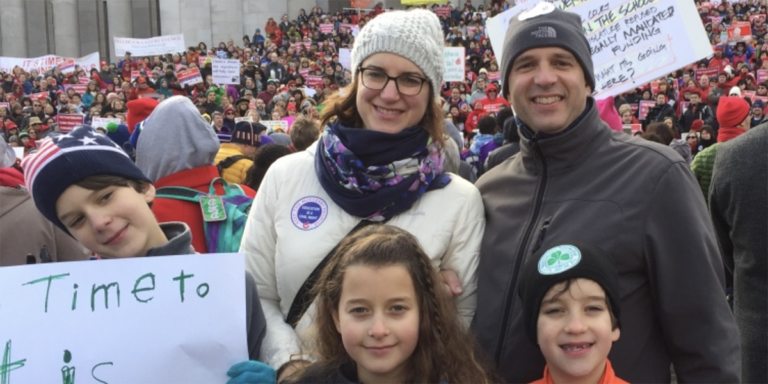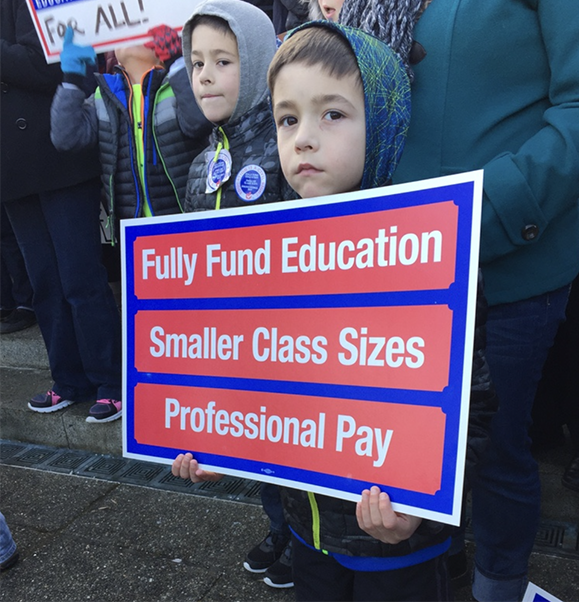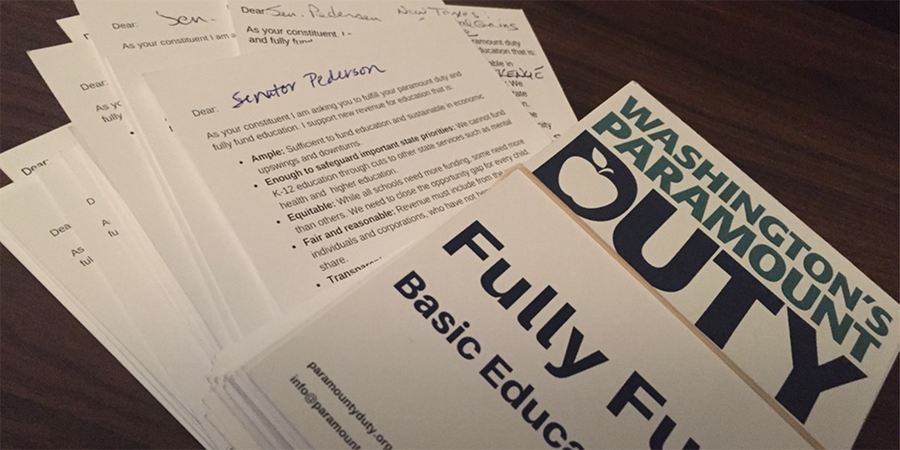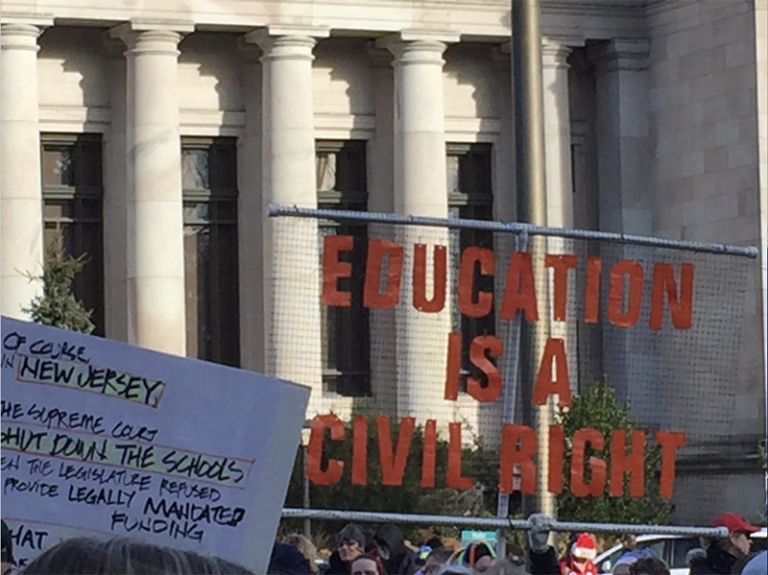
Tali Rausch with her brother and children at the 2017 Rally to Fully Fund Education at the Washington State Legislature in Olympia.
By Tali Rausch
Like you, I care about the state of the world, my city, and my community. I came to SVP with an interest in giving back and learning, through formal programming and informal connections, how to engage and support local community organizations that are addressing critical and systemic needs. In this blog post, I share why I’ve gotten deeply involved as a volunteer and SVP Board member and I invite you to join me on an advocacy journey.
I came to SVP after burning out from 2 years of practically full-time volunteer advocacy, looking to find a peer group that cared about supporting local nonprofits and mission-oriented work. As I got engaged, I realized that I had something unique to offer — experience in both advocacy and nonprofit work. I had the opportunity to volunteer with BELONG Partners (formerly Sound Discipline) and support its succession planning process. I was then asked to serve on the Search Committee and was thrilled when Emiko Atherton agreed to come on board as SVP Seattle’s Executive Director.
One of the reasons I was thrilled to have Emiko take the helm was her experience with advocacy and knowledge of how nonprofits can engage in advocacy. With the Reimagine Vision taking shape in 2021, and the critical transition toward trust-based philanthropy, Emiko was instrumental in developing the Board’s comfort level with adding advocacy to the organization’s strategic work.
We are evolving how we practice philanthropy to incorporate techniques such as advocacy and prioritizing using wealth, power, and privilege to change unjust systems. The future state we are building now includes expanding SVP Seattle’s toolbox to include collective advocacy, civic engagement, and activism. We believe advocacy must become as central to philanthropy as our existing culture of giving and service.
SVP Seattle Reimagine Vision
Growing up undocumented and living with food and housing insecurity instilled in me a lifelong passion for working on urban economic development and alleviating poverty. I’ve seen how critical education is to one’s ability to access economic opportunities. I have three children who attend Seattle Public Schools, and when the teachers went on strike in 2015, parents across the city became aware of the crisis of public school funding that led the state legislature to be held in contempt for not fully funding education per our state’s constitutional requirement.
In response to growing parent awareness and activism, I joined a group of Seattle Public School parents in founding Washington’s Paramount Duty, a volunteer parent advocacy group; in 2016, we prepared an advocacy campaign for fully funding education during the 2017 legislative session. I was on a vertical learning curve as I worked closely with a team of parent volunteers to develop political strategy, draft testimony, testify in committee, organize volunteers to testify in Olympia, and post updates on our Facebook page where thousands of parents were engaging and paying attention to what was happening in Olympia. I even got over my fear of public speaking to participate at the Ignite Education Lab speaker series at Seattle’s Town Hall. It was thrilling to learn how our state government works and how I, as an everyday citizen, can engage with lawmakers.

Rallying for fully funding education at the State Legislature in 2017.
My biggest takeaway from the two years of being a volunteer advocate for fully funding education was that simply showing up and stating your position on an issue makes a difference. Whether emailing or calling your legislator, meeting with them in Olympia, or testifying at a hearing, legislators pay attention when their constituents, who can vote them in or out of office, speak up. They know that those that speak up are representative of the dozens of busy people who have similar concerns but haven’t taken the time to contact them. Every call, email, and meeting is tracked by legislative office staff. The collective and sustained pressure of the voting public often makes all the difference in passing a bill or the 2-year Washington state budget.
I learned that by voicing my concerns to my two state representatives and one state senator, I was helping to educate and inform them about pressing community issues. When many voices unite to further positive change, the rallying call is more likely to be heard, understood and acted upon. Each voice is important and plays a role in reaching the overall goal.
This brings me to my current passion — the intersection of advocacy and philanthropy and supporting advocacy program development at SVP Seattle. Until recently, philanthropy has primarily been understood as the act of sharing time, financial resources, experience and skills in support of a societal cause and creating a better world. Adding advocacy, and specifically political advocacy, to the mix expands on this traditional definition of philanthropy in a very powerful way.
In 2017, Washington’s Paramount Duty’s goal, as a collective of public school parents, was to compel the legislature to amply fund public education. Ample funding would allow Washington state public school teachers and staff salaries to be increased, class sizes reduced, and schools could afford to hire librarians, nurses, buy books, etc.
By putting collective pressure on our elected officials during the 2017 legislative session, a coalition of educators, parents, civic organizations, and other volunteers helped pass a 2018-2019 budget that satisfied the State Supreme Court’s public school funding requirement. Many of us were engaging in advocacy for the first time — driving to Olympia, testifying in hearings, dropping off letters and postcards from constituents, contacting and meeting with legislators, etc. We organized meetings and rallies, recruited parents to attend lawmakers’ listening sessions, and partnered with other groups to turn out thousands on the steps of the state legislature on MLK Day in 2017.
Our voices have the power to affect our elected representatives‘ view on an issue and the way they vote for a bill or budget. Prior to my experience with Washington’s Paramount Duty, and my deeper understanding of belonging to the racial majority, I did not think to use my voice to advocate to the government for systemic change because the current economic, political, educational systems have often worked for me. But as I became more aware of the systemic racism that has consistently oppressed and economically disadvantaged Black, Indigenous, and People of Color (BIPOC), I realized that I have a responsibility to show up as an ally and advocate for health, economic, and social justice.
I now realize that it is imperative that I, as a philanthropist, show up to advocate for policy changes that help eliminate the many barriers to education, financial stability, health and basic needs for those in our community and in our state. I look forward to more SVP partners getting involved to advocate, bring our collective pressure to bear on policymakers, and support the passing of laws and budgets that improve educational, economic, and healthcare access for everyone.

Postcards signed by parents
addressed to Senator Pederson, advocating for fully funding education during
the 2017 legislative session.
SVP Seattle is launching its advocacy work by offering a learning series to understand the roots of persistent poverty and growing wealth inequality, and what we can really do about it.
Poverty & Wealth Inequality in Washington State
Register here for upcoming events.
I am proud that SVP Seattle is developing opportunities for partners to practice effective, achievable, and collective advocacy alongside giving and service. By leveraging your relationship networks – your ties, time, and talents – you can help community partners build their reach and influence and work together to achieve a more just future for everyone.
Community members who are most impacted by inequity are leading advocacy movements to achieve policy and structural changes. We envision SVP Partners learning to use their connections and voice to amplify the reach and influence of grantees and nonprofit partners. Together we can increase the capacity and impact of community-led movements for change.
If you are new to collective advocacy, you can explore and learn in small groups with other SVP Partners about simple and effective ways to become an advocate for community-led priorities. If you are ready to mobilize, we can connect you with urgent advocacy issues that we are working on now such as addressing the roots of wealth inequality.

